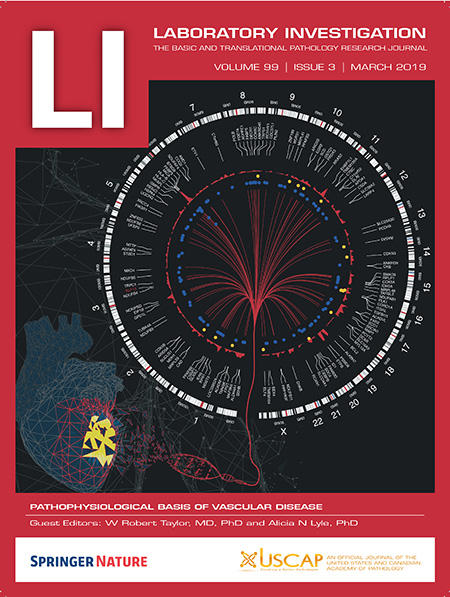 A study led by Adam R. Wende, Ph.D., associate professor in the University of Alabama at Birmingham Department of Pathology, was chosen for cover art in the March issue of Laboratory Investigation.
A study led by Adam R. Wende, Ph.D., associate professor in the University of Alabama at Birmingham Department of Pathology, was chosen for cover art in the March issue of Laboratory Investigation.
The cover art illustrates how the ischemic and failing heart can be sequenced and analyzed to define an epigenetic re-wiring of cardiac gene expression. As the journal Laboratory Investigation describes it, “The cover art illustrates how epigenomic reprogramming of the human left ventricle specifically impacts metabolic gene expression in the context of cardiac ischemia.”
This groundbreaking discovery offers novel insight into the mechanisms that control metabolism in the heart, which may serve as molecular features to target when developing individualized therapies for an otherwise irreversible disease.
Lead author on the project Mark Pepin developed the cover illustration to convey the key findings of the study. “I am definitely a visual learner,” Pepin said, “so creating diagrams and images helps me understand and communicate our work.”
In addition to the focus as the selected cover, Laboratory Investigation has also released a YouTube video highlighting a number of articles in the issue, including the study led by Wende and Pepin. The description starts about four minutes into the six-minute video.
Pepin is a sixth-year M.D.-Ph.D. student in the Medical Scientist Training Program. He recently defended his Ph.D. dissertation, titled “Genetic and epigenetic underpinnings of end-stage human heart failure.” Although he will receive his Ph.D. diploma in April, Pepin has already transitioned back into the clinic for the final two years of dual-degree training. Based partly on the heart study, and also seven others linked to gene expression, diabetes and other research completed during his Ph.D. training, Pepin also has been named as one of two recipients of the 2019 UAB Samuel B. Barker for Excellence in Graduate Studies Award.
Congestive heart failure is a terminal disease that affects nearly 6 million Americans. Yet its management is limited to symptomatic treatments because the causal mechanisms of congestive heart failure — including its most common form, ischemic cardiomyopathy — are not known. Ischemic cardiomyopathy is the result of restricted blood flow in coronary arteries, as occurs during a heart attack, which starves the heart muscle of oxygen.
In the research article, which was published online last year, Wende and colleagues described an underlying mechanism that reprograms the hearts of patients with ischemic cardiomyopathy, a process that differs from patients with other forms of heart failure that collectively are known as dilated, or non-ischemic, cardiomyopathies. This points the way toward future personalized care for ischemic cardiomyopathy.
The study used heart tissue samples collected at UAB during surgeries to implant small mechanical pumps alongside the hearts of patients with end-stage heart failure. As a routine part of this procedure, a small piece of heart tissue is excised and ultimately discarded as medical waste. The current study acquired these samples from the left ventricles of five ischemic cardiomyopathy patients and six non-ischemic cardiomyopathy patients, all men between ages 49 and 70.
As reported by UAB News, the researchers found that epigenetic changes in ischemic cardiomyopathy hearts likely reprogram the heart’s metabolism and alter cellular remodeling in the heart. Epigenetics is a field that describes molecular modifications known to alter the activity of genes without changing their DNA sequence.
“Altogether, we believe that epigenetic changes encode a so-called ‘metabolic plasticity’ in failing hearts, the reversal of which may repair the ischemic and failing heart,” Wende said.
The epigenetic reprogramming study is an example of the broad collaborations that take place at UAB, an institutional culture that is part of UAB’s strategic plan Forging the Future. Co-authors with Wende and Pepin included researchers from the UAB Department of Pathology’s Division of Molecular and Cellular Pathology and Division of Anatomic Pathology, UAB Department of Genetics and the Heflin Center for Genomic Science, the UAB Department of Medicine’s Division of Cardiovascular Medicine, and the UAB Department of Biomedical Engineering.
This study and the excellent research environment at UAB that has aided numerous other publications also contributed to Wende’s being named as one of two winners of the UAB Junior Faculty Dean’s Excellence Award in Research.